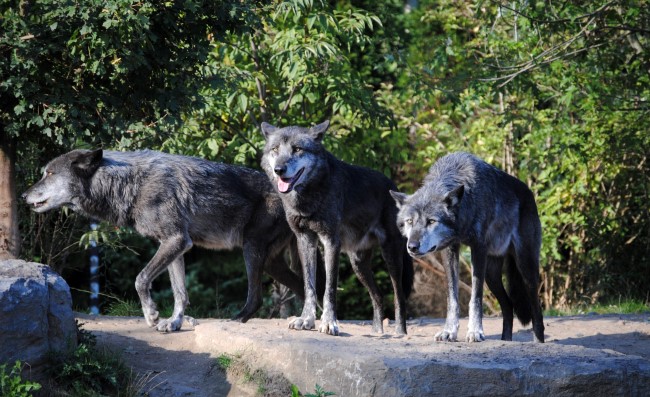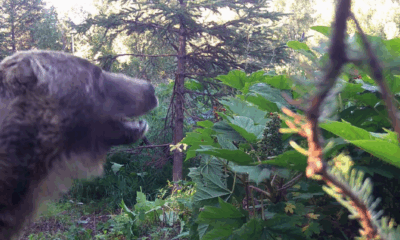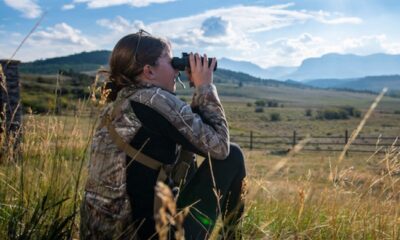Adventure
Say No To Colorado Wolf Re-Introduction, Says RMEF

One of the biggest conservation controversies is heating up in Colorado…
As we mentioned just a couple of weeks ago, the re-introduction of wolves into areas where they were previously extirpated is a huge controversy among conservationists. Today, the focus has shifted from the Hoodoo Pack of Arizona to Colorado, where the Rocky Mountain Elk Foundation (RMEF) just committed more than $300,000 to defeat a ballot that would re-introduce wolves to the state.
Why is the RMEF so concerned about Proposition 114? First, Colorado is home to North America’s largest elk herd. Wolf predation has had severe, negative effects on elk populations in other states. There is every reason to believe it would be the same for Colorado. In fact, Colorado’s professional wildlife managers spent $1 million studying wolf introduction over the years and rejected the idea four different times.
They’re already there
Furthermore, wolves are already confirmed on the ground and breeding in northwest Colorado. A wildlife biologist has already spotted at least one wolf pup, and this shouldn’t be a surprise to anyone. Wolves neither notice nor care about state lines, and they go where they please. If reintroduced in further numbers, wolves would spread into Rocky Mountain National Park and into surrounding states.
“It is also important to understand the same out-of-state environmental groups funding this forced wolf introduction also filed lawsuit after lawsuit to try to stop management of wolves in the Northern Rockies,” said Kyle Weaver, RMEF president and CEO. “It took an act of Congress to finally stop them,” he added. “One of those groups also filed a lawsuit just last summer seeking to force the government to introduce grizzly bears into Colorado, Utah, New Mexico, Arizona (including the Grand Canyon) and six other states.”
Who’s going to pay?
Then there’s the price tag, a bill that would come due at a time when taxpayers and the government are already stretched to the limits. A forced introduction would cost $6 million in new spending. All this during a time when COVID-19 impacts forced lawmakers to compensate for $3 billion in state budget losses that included massive cuts to education.
And what’s this? Proponents are offering zero dollars in funding for actual wolf introduction/management. That’s a problem. In 2018 alone, Wyoming taxpayers paid $1.5 million for wolf management while Washington taxpayers paid $1.2 million. The same would follow in Colorado.
Now, here’s the fun part! Although the proponents of this measure are more than happy to write a check out of Colorado taxpayers’ accounts, they were fine with using other people’s money to get Proposition 114 on the ballot … more than $1 million in out-of-state funding, in fact. They also used an out-of-state firm (Utah) to oversee the effort.
“This is not just about simply checking a box on a ballot. Proposition 114 would have significant, long-lasting, detrimental impacts on both wildlife and Coloradans,” said Kyle Weaver, RMEF president and CEO. “We are doing everything in our power to help educate Colorado voters about the very real costs that a forced introduction of an apex predator would have on wildlife management, wildlife populations, the hunting industry, ranchers and the pocketbooks of taxpayers who will be left to foot the bill.”
The impact goes beyond livestock
Yes, wolves are Hell on livestock. They’re known to go through herds of sheep and cattle like buzzsaws, often leaving the corpses of their kills to rot…but this isn’t just about ranchers and farmers. Colorado is also trying to reintroduce another historically present population of megafauna: moose. Right now, Colorado’s fledgling moose population clocks in at around 3,000. If wolves are reintroduced, we may as well go ahead and write the moose herd off right now.
Go here to find additional detailed information about the initiative and its impacts.
-

 Hiking & Climbing1 week ago
Hiking & Climbing1 week agoWhen Bears Bring the Drama: A Tail—or Should I Say “Tale”?
-

 Adventure1 month ago
Adventure1 month agoREACTION: Trump’s Make America Beautiful Again Agenda
-

 Gear2 months ago
Gear2 months agoLet Freedom RING! Primary Arms’ Independence Day Category Sale Starts NOW
-

 Adventure2 months ago
Adventure2 months agoU.S. Bighorn Sheep Going Home to Canada
-

 Fishing4 weeks ago
Fishing4 weeks agoMy Wacky Bush Brings All the Bass to the Yard
-

 Camping & Survival2 days ago
Camping & Survival2 days agoField Dressing 101: Knowing When It’s Their Turn
-

 Adventure3 weeks ago
Adventure3 weeks agoNo Ivy Required: University of Montana’s New Center for Hunting and Conservation






